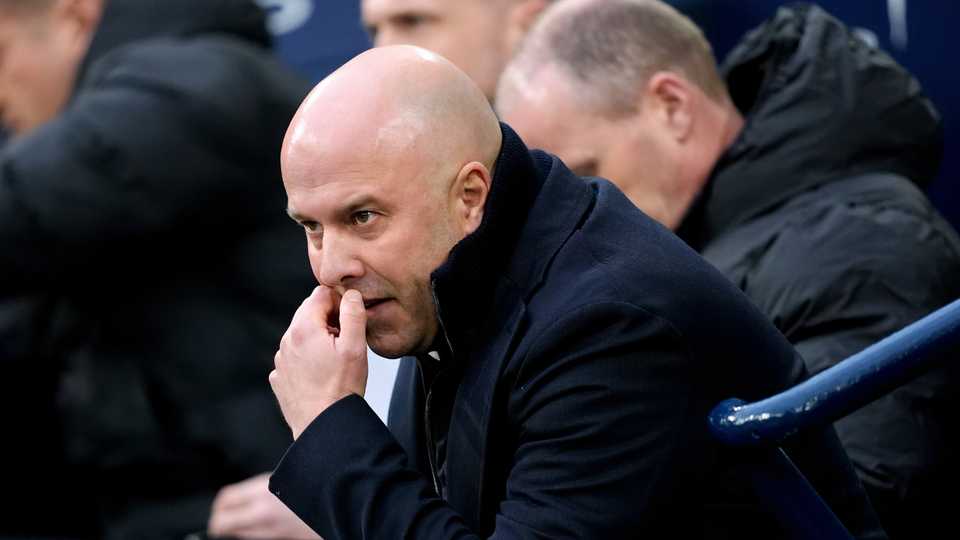Waste of Money: Liverpool Regret Deal for £125,000-a-Week Star Amid Slot Decision

Liverpool are already facing a summer of regrets before the season has even truly begun. The Reds, fresh off winning the Premier League last season in Arne Slot’s first year in charge, looked like a club on the rise. Fans were buzzing, pundits were optimistic, and the Merseyside giants were ready to defend their title in style. With a flurry of summer signings, including Hugo Ekitike, Alexander Isak, Florian Wirtz, Giovanni Leoni, and Milos Kerkez, the club’s ambition was clear: dominate domestic and European football again. But one signing, in particular, is beginning to raise serious eyebrows – Jeremie Frimpong.
Frimpong arrived at Anfield from Bayer Leverkusen in a £30 million deal last summer. At first glance, the Dutch international seemed like an exciting addition. A right-back by trade, Frimpong brought with him pace, attacking flair, and the versatility to play higher up the pitch, almost as a winger when the situation demanded. In Leverkusen’s system under Xabi Alonso, now the manager of Real Madrid, Frimpong thrived. He enjoyed the freedom to attack, overlap, and even drift into midfield when necessary. His defensive responsibilities were important but often secondary to his role as an offensive outlet.
But football at Liverpool is not exactly the same as it is at Leverkusen. Arne Slot’s system is more rigid in certain defensive aspects, particularly when it comes to full-backs in a traditional back four. The expectations are clear: balance attacking intent with defensive solidity. Here lies the problem. Frimpong’s instinct is to push forward, to get involved in attacks, but this tendency has left Liverpool exposed in moments when they should have been structurally compact. The very quality that made him a star in Germany is becoming a liability in England.
Liverpool’s season started with hope and optimism. Excluding the Community Shield, the Reds won their first five league games and even enjoyed a seven-game winning streak in all competitions. Yet, while the results were pleasing, the performances often suggested cracks beneath the surface. Late goals and narrow victories painted a picture of a team whose form, however thrilling, might not be entirely sustainable.
The warning signs came fast. Crystal Palace ended Liverpool’s unbeaten streak with a 2-1 win, demonstrating that Slot’s side could be beaten if opponents were organized and clinical. Then came a shocking 1-0 defeat to Galatasaray in the Champions League, followed by a 2-1 loss at Stamford Bridge against Chelsea. In just three games, Liverpool went from seemingly unstoppable to vulnerable. And within this context, questions about summer signings became unavoidable.
Florian Wirtz, naturally, attracted the most attention of Liverpool’s recruits. The German playmaker, also from the Bundesliga, seemed destined to become a central figure in Slot’s attacking play. But Frimpong, despite arriving on the same day, is the one drawing scrutiny. The Dutchman earns a significant £125,000 per week, yet he has struggled to cement a place in the team.
It’s important to remember that Frimpong is still adapting to the Premier League, one of the most physically demanding and tactically nuanced leagues in the world. Transitioning from Bundesliga football, where games are slightly more open and full-backs enjoy creative freedom, to English football, where mistakes are punished immediately, is no small task. Some fans and pundits have tried to defend him, arguing it’s too early to judge. Yet, even a few months into the season, his lack of impact is noticeable.
Frimpong has yet to complete a full 90-minute match for Liverpool. His appearances have been limited, and in some games, he hasn’t played at all. Against Chelsea, he was an unused substitute, with Slot preferring alternatives like Conor Bradley and Dominik Szoboszlai. Bradley, a promising young defender, and Szoboszlai, a natural midfielder adapting as a full-back, have outshone Frimpong despite his higher wages and experience. The irony is stark: a player brought in to strengthen the team has been sidelined, while cheaper or less specialized alternatives perform adequately, if not impressively.
Liverpool’s decision to spend heavily on a right-back when the team needed depth elsewhere is now being questioned. The club already boasts a solid left-back in Milos Kerkez, but the right side has become a point of concern. If Slot’s system cannot accommodate Frimpong’s attacking tendencies without compromising defensive stability, was this signing necessary at all? Some argue that the money could have been better invested in a central defender, a position where Liverpool genuinely need quality depth. The Reds’ backline, though capable, has shown vulnerability against top opposition, and Frimpong’s struggles have only exacerbated that issue.
Critics of Frimpong’s Liverpool tenure also highlight tactical mismatches. In Leverkusen’s system, the Dutchman was given license to drift into midfield or attack freely, with teammates covering his defensive gaps. In Slot’s Liverpool, the same freedom is not afforded. Full-backs are expected to be disciplined, to track runners, and to maintain shape in both attack and defense. Frimpong’s natural instincts clash with these requirements, leaving him caught between the desire to attack and the obligation to defend.
The psychological side of adaptation should not be ignored. Frimpong is in a new country, a new league, and a club with massive expectations. The pressure at Liverpool is immense; fans and media scrutinize every touch, pass, and decision. For a player accustomed to performing in a system that allowed him creative liberty, adjusting to the intense demands of Premier League football can be daunting. Confidence, form, and tactical understanding all need time to align, yet in football, time is a luxury few players are afforded.
Liverpool’s front office will be watching closely. Every manager has his own vision, and Slot’s approach demands specific qualities from players in key positions. Frimpong’s limitations in fitting into the system, coupled with his wage, raise questions about value for money. The £30 million spent on him might seem reasonable in isolation, but when compared to alternative reinforcements, particularly in defense, the cost-benefit analysis begins to look less favorable.
Fans have already started to voice concerns online. Social media threads are filled with speculation about Frimpong’s role in the squad. Some supporters argue for patience, pointing out that Wirtz also needed time to adapt but has shown glimpses of brilliance in recent weeks. Others are less forgiving, questioning whether Liverpool made a strategic misstep in signing him at all. The debate is fueled by a string of results that have exposed weaknesses in Liverpool’s backline, weaknesses that Frimpong was meant to help address.
The reality is that football is unpredictable. A player who struggles initially can find form later, and a club can adjust tactics to suit personnel. Liverpool have history on their side, having developed players who initially underwhelmed but later became crucial contributors. However, the early signs for Frimpong are concerning. He is now competing for minutes with younger or more adaptable teammates, and in a high-stakes environment like Liverpool, falling behind early can have long-term consequences.
Slot, known for his tactical acumen and attention to detail, faces a delicate balancing act. He must integrate his summer signings effectively while maintaining the team’s momentum in multiple competitions. Frimpong’s situation exemplifies the challenges of modern football management: blending individual talent with system requirements, managing egos, and ensuring squad harmony.
Looking at the numbers, Frimpong has yet to contribute decisively. He has not completed a full match, has been outshone by peers, and has struggled with defensive positioning. The tactical mismatch and his natural attacking instincts have left him exposed, particularly when Liverpool are caught on the counter-attack. Meanwhile, his wage of £125,000 per week adds to the scrutiny, as fans and pundits weigh performance against financial commitment.
It’s worth noting that adaptation periods are common for players moving from Bundesliga to Premier League. The pace, physicality, and intensity are markedly different. Even world-class players require time to adjust. However, the clock is ticking for Frimpong. Liverpool cannot afford prolonged adjustment periods for key positions, especially when defensive stability is crucial for success in both domestic and European competition
Frimpong’s teammates have generally performed well in his absence. Conor Bradley, though younger and less experienced, has impressed in his appearances. Dominik Szoboszlai, naturally a midfielder, has adapted to the right-back role with surprising effectiveness. Their performances raise further questions about whether Frimpong was truly the most necessary signing for Liverpool this summer. Could the club have prioritized central defense or another area of the pitch instead?
Liverpool’s recruitment strategy this summer was ambitious, to say the least. Over £300 million was spent on attacking players alone, including Ekitike, Isak, and Wirtz. Defensive additions like Leoni and Kerkez were also part of the plan. Yet, the Frimpong deal now stands out as potentially the most questionable. The Dutchman has talent, no doubt, but the fit with Slot’s tactical setup seems imperfect.
Some supporters have remained optimistic, suggesting that Frimpong simply needs time and guidance to adjust. They point to his pace, attacking ability, and previous Bundesliga performances as evidence that he can succeed. Others remain skeptical, arguing that Liverpool’s current vulnerabilities highlight the miscalculation in signing him. The debate continues, and only time will tell whether Frimpong can reverse the early impressions.
Liverpool’s challenges this season extend beyond Frimpong. Injuries, tactical tweaks, and competition for places will all play a role in the squad’s success. But the Dutchman’s situation is symbolic of a broader theme: even big-money signings with promise can struggle if the system, environment, or expectations do not align perfectly.
The next few months will be crucial for Frimpong and Liverpool alike. If he adapts successfully, he could prove to be a shrewd signing. If not, questions about the club’s recruitment strategy, financial prudence, and tactical planning will grow louder. Fans and pundits will watch closely, analyzing every performance and minute played. For now, the early verdict leans toward caution and concern.
In football, timing, system fit, and confidence are everything. Frimpong’s talent is undeniable, but Liverpool must find a way to integrate him effectively, or risk having a player who commands high wages without delivering the expected returns. The stakes are high: Premier League glory, Champions League ambitions, and fan expectations all hang in the balance.
Liverpool’s story this season is already shaping up to be a dramatic one. A summer of big signings, high expectations, and early setbacks paints a picture of a club navigating both opportunity and risk. Jeremie Frimpong’s struggles are part of this narrative – a cautionary tale of how even talented players can face challenges in adapting to a new league, new manager, and new tactical demands.
As the season progresses, every game will matter. Frimpong will have chances to prove himself, but the window for redemption is not infinite. Liverpool fans will watch with hope and anxiety, knowing that their club’s success may hinge on whether this summer’s investment, particularly in Frimpong, pays off. The drama of football, as always, is in full swing.
In conclusion, Liverpool’s £30 million signing of Jeremie Frimpong, earning £125,000 per week, has not yet delivered the expected impact. While talented and capable of brilliance, the Dutch international struggles to fit into Arne Slot’s system, leaving him behind in the pecking order. Questions about tactical fit, financial prudence, and squad planning abound. Liverpool’s other recruits have had mixed starts, but none have sparked as much debate as Frimpong. Whether he becomes a key figure or a regrettable expense remains to be seen, but the early warning signs are clear: sometimes, even highly talented players need the right system, guidance, and timing to succeed at the highest level.















